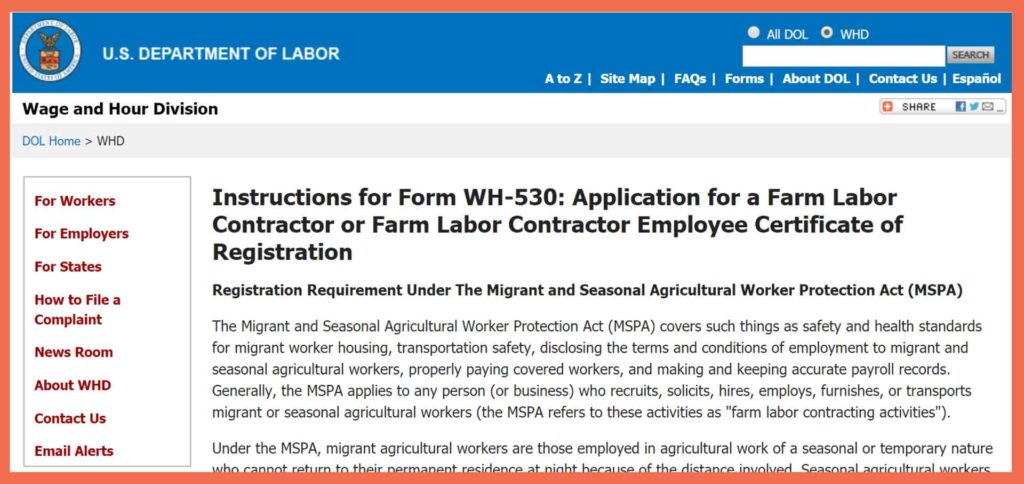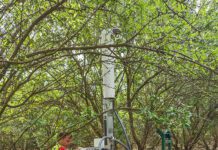As harvest gets underway for some and is in full swing for others, the issue around having sufficient labor persists. The challenge drives many growers to use a farm labor contractor (FLC) as a means for ensuring there are enough people to get the job done. Often times, though, growers use FLCs believing that in doing so, there is a firewall of protection between them and the liability of having workers. Nothing could be further from the truth in California. It is critical that growers not only understand the risks inherent in working with a FLC but also how to vet a contractor to ensure the best possible working relationship.
The Farm Labor Contractor Risk
In 2015, California modified the Labor Code, Section 2810.3 to more fully define joint employment liability specific to worker safety and wage and hour-related issues. The change impacted all employers, not just those in agriculture, and applies when the contracting company (for our purposes, the grower), uses six or more employees from the contractor. If fewer than 20 employees are working between both businesses, there is an exemption from these provisions. However, during the peaks in season when the need for bodies exist, this allowance is rarely of any help.
The regulation holds the grower equitably responsible with the FLC for ensuring workers are protected from possible injury and illness, and that all the conditions of employment, including but certainly not limited to stipulated wages, a workplace free from harassment and discrimination, and paid sick leave and health insurance are provided. As such, the grower must take steps to ensure that the FLC they work with is in compliance with all the applicable employment laws and that they demonstrate a good faith effort to stay informed of the FLCs business practices in these areas.
It is important to note that there are also two federal regulations relating to joint employment liability. The Code of Federal Regulation, Section 29, 791.2 says this type of liability exists where the employee has two (or more) technically separate but related or associated employers. The Code of Federal Regulation, Section 29, 500.20(h)(5) defines joint employment as when one employer provides labor to another employer and the workers are economically dependent on both employers. In most instances in agriculture, the grower/FLC relationship constitutes joint employment under one, if not both of these definitions.

The U.S. Department of Labor, Wage and Hour Division enforces the regulations specific to joint employment liability and, along with the California Department of Industrial Relations, Division of Labor Standards Enforcement, will hold a grower liable for the failings of his or her farm labor contractor.
As a result, a grower’s risk has grown because both the U.S. Department of Labor and the California Division of Labor Standards Enforcement can cite the business for the same violation by the farm labor contractor. This is an instance of two-for-the-price-of-one and not in the good way. With so much at stake, it is critical that growers take the time to vet their FLC annually as well as request evidence of compliance throughout the course of the season.
Vetting Your Farm Labor Contractor
Prior to the start of the season when a grower will need the services of a FLC, it is important to request evidence of compliance with the litany of employment laws impacting the contractor, as well as those that fall under the auspices of joint employment liability. If the contractor is not able to provide written evidence of compliance, that is the sign that the grower may need to consider finding a new farm labor contractor. At minimum, the FLC should be providing the following documentation:
- Copy of his/her State of California FLC License
- Copy of his/her Federal FLC Certificate of Registration
- If providing worker transportation, Transportation Authorization should be noted
- If providing worker housing, Housing Authorization should be noted
- Proof of workers’ compensation insurance
- Proof of general liability insurance
- Copy of his/her Injury and Illness Prevention Program
- Copy of his/her Heat Illness Prevention Program
- Copy of his/her Employee Handbook, including an Anti-Harassment and Discrimination Policy
- Evidence of the following annual training for supervisors and workers:
- Sexual Harassment Prevention (2 hours for supervisors, 1 hour for workers)
- General Workplace Safety
- Heat Illness Prevention
- Worker Protection Standard
- First Aid/CPR (1 trained individual for every 20 workers)
- Evidence of worker wage and other compensation terms and conditions provided to the crew that will be contracted
- Copy of a paystub, with confidential information removed

In California, farm labor contractors (FLCs) must possesses both a state FLC license as well as a Certificate of Registration, issued by the U.S. Department of Labor, Wage and Hour Division, as seen here.
If, after review of these elements and determining compliance, moving forward working with the contractor makes sense it is also important to check in on the FLC and his or her crews periodically throughout the season. Onsite, you should be looking for the following, which demonstrates actionable compliance related to the paperwork initially reviewed:
- First aid kits with each crew
- Sufficient water and shade for the number of workers present
- Clean, usable portable toilets
- An emergency action plan, including a map of how to safely evacuate the property, easily accessible for workers
- Required postings, including Pesticide Safety Information Sheet A-8 and A-9
Should something appear amiss during a field visit, it is critical to communicate what was deficient with the farm labor contractor and determine the immediate corrective action plan. It is also important that follow-up occur to ensure changes are made. Failing to do so more simply codifies the definitive liability, as defined under California regulations, for the grower based on the lack of compliance by the FLC.
Keep in mind that both the list of items to review prior to engaging a contractor and the list of elements to evaluate in the field are not exhaustive. For a complete, robust list, contact AgSafe at safeinfo@agsafe.org or 209-526-4400. That being said, these provide an excellent place for growers to start the critical and important task of further protecting their business by more thoughtfully considering who to engage when trying to tackle the ever-present labor problem.
For more information about how to fully vet a farm labor contractor or any worker safety, human resources, labor relations, pesticide safety or food safety issues, please visit www.agsafe.org, call (209) 526-4400 or email safeinfo@agsafe.org. AgSafe is a 501c3 nonprofit providing training, education, outreach and tools in the areas of safety, labor relations, food safety and human resources for the food and farming industries. Since 1991, AgSafe has educated over 85,000 employers, supervisors, and workers about these critical issues.







![shutterstock_255118591-[Converted]](https://wcngg.com/wp-content/uploads/2019/09/shutterstock_255118591-Converted.jpg)








